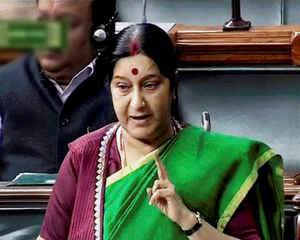New Delhi, Mar 9: The 39 Indians, who have been held as captives by the dreaded ISIS in Iraq since June 2014, are believed to be still alive, External Affairs Minister Sushma Swaraj told Lok Sabha today, as she asserted the government is making all efforts to bring them back.
Out of the 40 Indians from Punjab who were kidnapped by ISIS militants from a construction site in Mosul in June 2014, one of them escaped and made a claim that the remaining captives might have been killed. The Indian government had however denied the claim.
During the Question Hour, Swaraj referred to a recent meeting in which foreign ministers from Arab countries and 15 ministers participated and said the leaders of two major nations had told her that the abducted Indians were alive.
Swaraj said that if the Indians were stranded, the government would have brought them long back but they are in the captivity of terrorists.
"I completely don't believe that those people are dead ... If we believed that boy's version then I would have told this House that all are dead. But we don't believe the boy's claim and that is why we are searching for the people," she said.
Swaraj also said there has been no "big exodus" of Indians from foreign countries in the wake of steep fall in crude oil prices which has adversely affected job prospects.
She was responding to a query on what action the government plans to take as many companies overseas were sending back Indians amid decline in oil prices, a matter of concern to Kerala that has a large number of NRIs.
This is a future problem and the government is aware about it, Swaraj said.
Emphasising that welfare of Indians living abroad was a priority for the government, Swaraj said it is working from all sides to address problems faced by them.
Whenever such problems are brought to her notice, "I look at it personally and in case of emergency situations, we try to address the issue within 24 hours", she said.
In such situations, "I don't look at a person's language, state or religion. For me, they all are Indians," Swaraj said while expressing confidence that such problems would be resolved completely.
The Minister came in for praise from some members in the House for the handling of problems faced by Indians abroad, including rescuing them and ensuring their return home.
BJD and AAP members appreciated Swaraj for her efforts. BJD's Baijayant Panda said the response from the Ministry has been "outstanding" and there has been a dramatic improvement in this regard.
Besides thumping of desks by members from Treasury benches, BJD's Baijayant Panda and AAP members Dharamvir Gandhi and Bhagwant Mann appreciated the Minister for helping Indians facing difficulties in foreign countries.
The AAP members thanked her for taking speedy action in ensuring the rescue and return of around 19 people, hailing from Punjab, from Saudi Arabia.
Opposition members, including those from the Left, were also seen thumping benches.
In response, Swaraj said she thanked the members for their sentiments. Speaker Sumitra Mahajan too was heard saying that it was the Minister's day today.





Comments
Add new comment